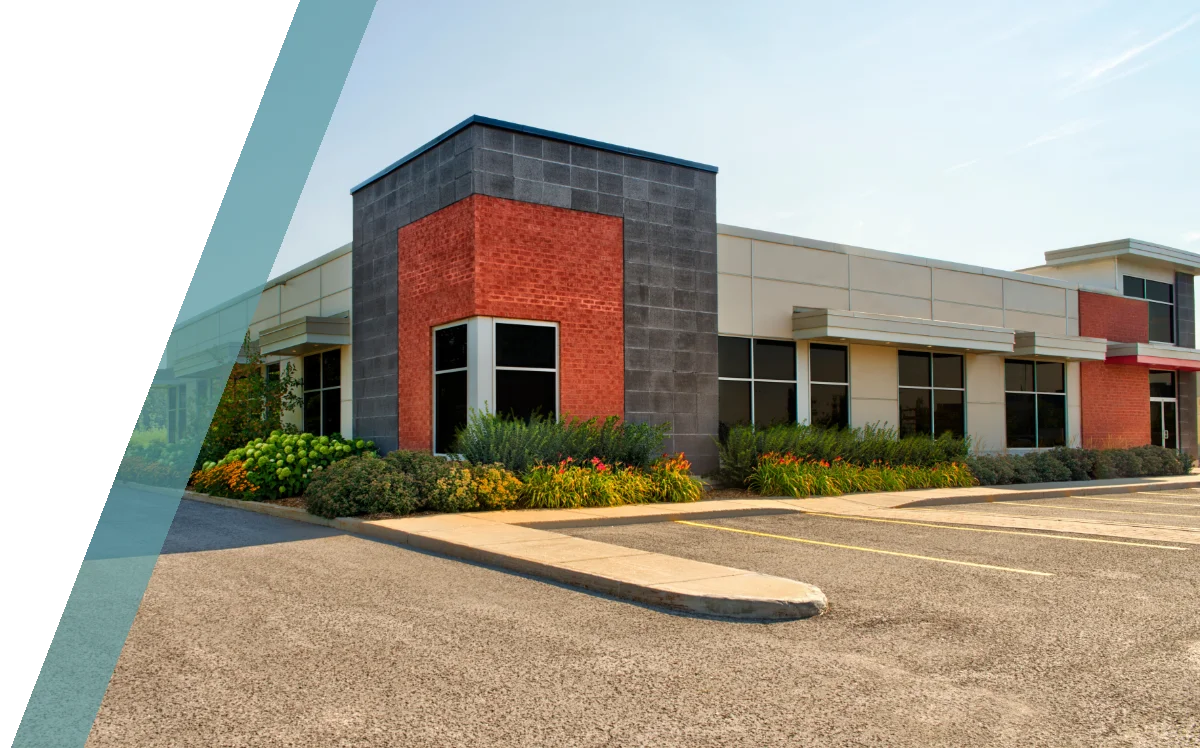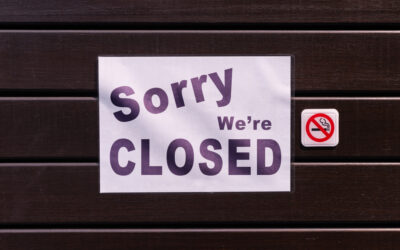Unoccupied Commercial Property Insurance
If your commercial property is currently unoccupied, a standard commercial property insurance policy may not cover you
“Shuaib followed up my enquiry very promptly and soon found a suitable policy for my small business.”

Unoccupied Commercial Property Insurance
A standard commercial property insurance policy may not cover you if your commercial property is not currently in use. If your commercial property is vacant, or undergoing renovation, then you may need a dedicated unoccupied commercial property insurance policy to give you the cover you need.
At Anthony Jones, we can help you get comprehensive unoccupied commercial property insurance at a competitive price.
Why Do I Need Unoccupied Commercial Property Insurance?
Insurers consider all kinds of unoccupied properties to be higher risk than occupied properties. When a property is unoccupied, if anything goes wrong – such as a fire or a flood – there may be nobody around to address the issue, meaning that small problems can quickly spiral into disasters.
Plus, unoccupied properties tend to be more vulnerable to vandalism and break-ins. If your unoccupied commercial property is getting renovated, for example, thieves may break in to steal valuable equipment, and there will likely be nobody around to stop them.
It’s because of these increased risks that many insurers are reluctant to insure unoccupied commercial properties.
What Does Unoccupied Commercial Property Insurance Cover?
A dedicated unoccupied commercial property insurance policy will cover you for all the risks your property will be exposed to while it is unoccupied, including:
- Fire
- Flood
- Vandalism
- Theft
- Injuries to members of the public
While your property may be unoccupied, unoccupied property insurance will also provide cover for any injuries members of the public may sustain in and around your property – if a curious “urban explorer” injures themselves while looking around your empty property, for example.
When Do You Need Unoccupied Commercial Property Insurance?
First, check your current commercial property insurance policy, to see what sort of cover it provides for unoccupied properties. You may find that your current policy stops providing cover if your commercial property is unoccupied for any stretch of time.
Here are some situations when you may need unoccupied commercial property insurance:
- Your tenant needs to vacate the property while it undergoes renovations.
- The business has decided to relocate, and will not be renewing their lease, so the property will be empty until you find a new tenant.
- A tenant has gone out of business, so will be leaving the property sooner than you expected.
Types of Commercial Property We Cover
We can tailor specialist unoccupied commercial property cover for:
- Shops
- Restaurants and cafes
- Pubs and bars
- Warehouses
- Office space
Requirements From Insurers for Unoccupied Properties
Insurers may outline certain measures you will need to take to keep your commercial property safe for as long as it’s unoccupied. This might include:
- Investing in extra security, to deter break-ins and vandalism.
- Hiring onsite security, or periodically checking on your property.
- Clearing all waste and other flammable materials.
- Turning off utilities, to help prevent flood.
At Anthony Jones, we can advise you on the steps you could take to keep your unoccupied commercial property safe, to give you total peace of mind along with the best possible price on your policy.
Get Specialist Unoccupied Commercial Property Insurance From Anthony Jones
Many insurers are reluctant to cover unoccupied commercial properties. They think the risks are too high. If you’re struggling to get adequate cover for your unoccupied commercial property, we’re here to help.
Tell us about your property, its location, and about how long you expect it to be unoccupied. We can then advise you on the steps you’ll need to take to secure your property, before helping you to get dedicated unoccupied commercial property insurance to give you the cover you need, for as long as you need it.
Need more
information?

Please call the team on 020 8290 9080 to talk through your insurance needs for your unoccupied commercial property.
Alternatively, you can email us at business@anthonyjones.com
“Following a serious fire at one of our contract sites which caused damage in excess of £400,000, the claims service and commercial advice provided by Anthony Jones was exceptional.
From numerous site visits, liaison with loss adjusters and the principal, Anthony Jones arranged for interim payments as we rebuilt the property which was completed ahead of schedule.
Anthony Jones were on hand to take us step by step through the claims process which ultimately ended up with a very satisfied landlord, and a rebuilt property ahead of schedule.”
Mr Tomasz Stozek
Director
S.T. Building Ltd
FAQ’s
Some of our most asked questions, answered below:
What is business insurance?
Business insurance is a type of insurance that provides cover for businesses against financial losses due to unexpected disruption to business such as property damage, liability claims, a cybercrime issue, an issue with a director's duties, a professional indemnity or a motor accident – amongst others!
I am a start-up business, what insurance do I need?
There is a balance between adequate and appropriate protection of the business whilst keeping initial costs to a minimum. Evaluate your business risks and the need for insurance under these 4 headings:
- Assets (both physical and intellectual);
- Revenue streams;
- Liabilities to Third Parties (including contractual obligations);
- People (your staff including their importance to the business).
Usually, a package type policy covering your physical property, annual revenues, Employer’s liability and Public/Product’s liability is required. The only insurances required by law are Employer’s Liability, Motor Liability (if you have cars/vans etc) and Engineering Inspection of lifting and pressure plant if you have them.
Do I need business insurance?
If you own a business, it is highly recommended that you have business insurance to protect your assets. The only insurances required by law are Employer’s Liability, Motor Liability (if you have cars/vans etc) and Engineering Inspection of lifting and pressure plant if you have them. Increasingly, suppliers or customers will ask for evidence of insurance.
How much does business insurance cost?
The cost of business insurance varies depending on the type of cover you need, the size of your business, and the level of risk associated with your industry. Insurance brokers help with this presentation to insurers in seeking the most appropriate market and price.
Do the Government tax insurance premiums?
Yes, they do. The current rate is 12% and is a charge collected by insurers on behalf of the Government. This tax has nothing to do with insurance brokers or insurers.
How do you earn your money?
Insurance brokers earn money in the form of commissions when business is placed with insurers. You have every right to ask a broker what commission they are earning from insurers. An alternative to commission is to quote premiums “net” and brokers agree a fee with customers for services.
Reviews

Straightforward, thankyou
Stephen Passfield is our account handler is one of the best agent we've worked with.
He is very helpful,kind and flexible to us and always there for us.
We've couldn't asked for more.
Thank you much for help for whole these years.
We really appreciate and very grateful to you.
We highly recommend him and his team
TM Brothers Transport
Their agents always very kind, flexible and helpful.
I highly recommend them.
"I chair a campaign to save our local pub. We launched a share sale and succeeded in buying the Crown a few days ago, so we needed help in selecting the right insurance for the site whilst renovations were under way, including unoccupied property cover. Tony Ellis of Anthony Jones Insurance was really helpful in guiding us through this process, and we now have the correct cover in place. Fast, easy to deal with & knowledgeable - just what you need from your insurance broker! Well done Tony and all at A Jones."
News
Should 24 Month Indemnity Periods Be Standard For Business Interruption Insurance?
Aviva recently launched the UK’s first ever automatic 24 month business interruption indemnity period. In this post we’ll explain the rationale behind this move, before discussing why we think a 24 month indemnity period should come as standard on all business...
Insurance Premium Finance and Underinsurance
Why monthly payments shouldn’t mean lower cover for SMEs. The rising cost of business insurance is driving more SMEs to rethink how they pay, but not how much they insure. At Anthony Jones Insurance Brokers, we support recent findings from Premium Credit highlighting...
VPN Policy: Do Personal VPNs Pose a Risk to Businesses?
Since the introduction of the Online Safety Act, VPN use has surged in the UK. One provider reported a 1,800% rise in daily sign-ups. Unfortunately, certain VPNs may pose a risk to your business’s cybersecurity. So in this post, we’ll discuss how a VPN policy can help...
New High Rise Building Regulations & Their Impact on Insurance
The Government introduced the Building Safety Act 2022 in response to the Grenfell Tower fire. This legislation is intended to improve building safety standards, with a particular focus on high rise buildings. In this post we’ll discuss these new high rise building...




